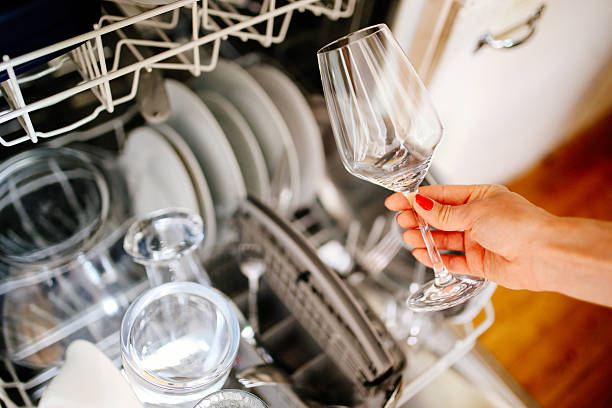A dishwasher is a modern kitchen appliance designed to simplify the task of dishwashing, providing efficient cleaning and sanitization. However, encountering poor dishwashing results can be frustrating and defeat the purpose of this convenient appliance. In this comprehensive guide, we will explore common issues that may lead to subpar dishwashing results, their potential causes, and practical solutions to ensure your dishwasher delivers sparkling clean dishes every time.
Identifying Poor Dishwashing Results
Residue on Dishes: The presence of food residue, grease, or soap scum on dishes after a wash cycle is a clear indication of poor dishwashing results.
Cloudy Glassware: Cloudiness on glassware, often accompanied by water spots, can detract from the visual appeal of your dishes.
Incomplete Drying: If your dishes are not drying properly, resulting in damp or wet items at the end of the cycle, it signals an issue with the dishwashing process.
Unpleasant Odors: Lingering odors inside the dishwasher or on dishes may suggest insufficient cleaning or inadequate rinsing.
Potential Causes of Poor Dishwashing Results
Insufficient Water Temperature:
Hot water is essential for effective dishwashing. If the water temperature is too low, detergents may not activate properly, leading to poor cleaning results. Check the water heater settings and ensure they are at the recommended temperature (usually around 120°F or 49°C).
Clogged Spray Arms:
The spray arms in the dishwasher play a crucial role in distributing water for cleaning. If the spray arms are clogged with debris or mineral deposits, water distribution becomes uneven, resulting in poor cleaning.
Incorrect Loading:
Overloading the dishwasher or improperly arranging dishes can obstruct the water spray and prevent proper cleaning. Follow the manufacturer’s guidelines for loading to ensure optimal performance.
Expired or Low-Quality Detergent:
The type and quality of detergent used significantly impact dishwashing results. Expired or low-quality detergents may not break down grease and food residues effectively. Use a high-quality detergent suitable for your dishwasher and water hardness.
Faulty Rinse Aid Dispenser:
Rinse aid is essential for preventing water spots and promoting drying. If the rinse aid dispenser is malfunctioning or empty, it can lead to poor dishwashing results.
Hard Water Deposits:
Hard water contains mineral deposits that can accumulate on dishes, glassware, and internal dishwasher components, affecting overall performance. Consider using a water softener or descaling agents to combat hard water deposits.
Clogged Filters:
Dishwashers have filters to trap debris and prevent it from circulating during the wash cycle. Clogged filters reduce water flow and can lead to poor cleaning results. Regularly clean or replace filters according to the manufacturer’s recommendations.
Faulty Heating Element:
The heating element is crucial for activating detergent and aiding in the drying process. If the heating element is defective or not functioning optimally, it can result in poor dishwashing outcomes.
Troubleshooting and Solutions
Check Water Temperature:
Verify that your dishwasher is connected to a hot water supply, and the water heater is set to the recommended temperature. Insufficient water temperature can compromise the effectiveness of detergents.
Clean Spray Arms:
Remove the spray arms and clean them thoroughly. Use a small brush or toothpick to clear any debris or mineral deposits from the spray arm nozzles. Ensure unobstructed water flow for even distribution.
Adjust Detergent Amount:
Check the detergent dispenser settings and adjust the amount of detergent based on your dishwasher’s recommendations. Using too much or too little detergent can impact cleaning results.
Inspect Rinse Aid Dispenser:
Ensure the rinse aid dispenser is functioning correctly and is filled with rinse aid. Adjust the dispenser settings according to your dishwasher’s guidelines. Regularly check for any clogs or malfunctions.
Evaluate Loading Technique:
Follow the manufacturer’s guidelines for loading dishes to ensure proper water circulation. Avoid overloading the dishwasher and arrange items strategically for optimal cleaning.
Use High-Quality Detergent:
Invest in a reputable dishwasher detergent designed for your dishwasher model and water hardness. Check the expiration date on the detergent packaging to ensure freshness and effectiveness.
Descale Your Dishwasher:
If you live in an area with hard water, periodic descaling is essential. Use descaling agents or home remedies like vinegar to remove mineral deposits and scale from the dishwasher’s interior components.
Clean Filters:
Regularly clean or replace filters in accordance with the manufacturer’s instructions. Clean filters ensure unimpeded water flow and contribute to better dishwashing results.
Check Heating Element:
Inspect the heating element for visible damage or signs of wear. A faulty heating element can impact the activation of detergents and drying. Replace the heating element if needed.
Run an Empty Load with Vinegar:
Occasionally run an empty dishwasher cycle with a cup of white vinegar placed on the top rack. This helps remove built-up residue, odors, and mineral deposits.
Preventive Measures
Regular Maintenance:
Implement a routine maintenance schedule for your dishwasher, including cleaning filters, inspecting spray arms, and descaling as needed. Regular maintenance prevents the accumulation of debris and ensures optimal performance.
Use Water Softeners:
If you live in an area with hard water, consider using water softeners or installing a water softening system. This helps minimize mineral deposits on dishes and internal components.
Read Manufacturer Guidelines:
Follow the manufacturer’s guidelines for detergent usage, loading techniques, and maintenance. Adhering to these recommendations contributes to efficient dishwashing results.
Monitor Water Heater Settings:
Regularly check and adjust your water heater settings to ensure that hot water is consistently available for your dishwasher. Optimal water temperature enhances cleaning performance.
Address Issues Promptly:
If you notice any issues with dishwashing results, address them promptly to prevent further complications. Timely troubleshooting and maintenance contribute to the longevity of your dishwasher.
Professional Assistance
– If, after following the troubleshooting steps, you still experience poor dishwashing results, it’s advisable to seek professional assistance. Certified technicians can conduct a thorough inspection, identify underlying issues, and perform necessary repairs to restore your dishwasher’s optimal functionality.
A dishwasher is a valuable kitchen appliance that, when functioning correctly, streamlines the dishwashing process. By understanding the potential causes of poor dishwashing results, implementing troubleshooting steps, and adopting preventive measures, you can ensure that your dishwasher consistently delivers clean, sanitized, and spotless dishes. Regular maintenance and attention to key components contribute to the efficiency and longevity of your dishwasher, making it a reliable asset in your kitchen.
If you’re having a problem with a home appliance, the best option is to contact us at HOME APPLIANCE SERVICE CENTER – the leading Repair Service Provider in San Diego. Our superior performance, accuracy, knowledge and experience make us the top choice for your repair needs. Plus, our friendly attitude and free maintenance consultation make us even more appealing. And, our after-service warranty is unbeatable. We’re open 24/7, including weekends and holidays, and in emergencies, an engineer will arrive at your door within 15 minutes of your call. So, don’t hesitate – give us a call, and HOME APPLIANCE SERVICE CENTER will solve any problem.
Contact us
 619-928-5000
619-928-5000  Request Service
Request Service 
